Despite legislation aimed at helping firefighters get compensation, many are being denied

Although Hamilton firefighters are filing work-related cancer claims at twice the provincial rate, hundreds are still being denied compensation.
That’s according to data from Ontario’s Workplace Safety and Insurance Board (WSIB), which shows that 22 firefighters are considered for work-related cancer benefits for every 100,000 people in Hamilton. That’s compared to the provincial rate of 11 claims for every 100,000 in Ontario, and 10 for every 100,000 in Ottawa.
The high incidence among firefighters could be explained by their relatively high exposure to cancer risks. This includes the infamous Plastimet chemical fire in 1997. The fire took days to put out, and left many firefighters suffering short- and long-term health effects. It was the basis for 2007 legislation to make it easier for Ontario firefighters to claim for work-related cancers.
While that should have simplified and clarified the claims process, many claims considered by the WSIB are still rejected. In addition, many cancers that are apparently work-related don’t even get considered for review. Out of all claims filed by the Hamilton firefighters’ union, the overall acceptance rate is 25%, with hundreds reportedly being denied their right to compensation.
Hamilton firefighters are reportedly at increased risk because of the region’s role in the Canadian economy. “We're the industrial heartland of the country,” Dr. Mike Pysklywec, a Hamilton-based physician and occupational health expert, told CBC News.
Repeated exposure to burning plastic, heavy metals, and asbestos increases the chances of firefighters taking in carcinogens. Pysklywec said cancer could arise 15 to 20 years after such exposure, which means cancer cases being reported today could be linked to the Plastimet fire.
After the incident, the city of Hamilton started a program to screen for cancers and other illnesses that might otherwise be overlooked. Firefighters also became more aware of the risks they face, and the union has become more proactive in detecting and filing claims — a development that might also be contributing to the high claim rate in Hamilton.
Data from the WSIB says that Hamilton firefighters have filed 116 claims for work-related cancer, 68% of which have been approved. But records from the city’s firefighters union say they’ve filed more than 300 claims, some dating back 25 years; of those, only 25% have been approved.
Under the rules of the presumptive cancer legislation designed for firefighters, certain cancer cases may be denied. For example, for kidney cancer to be considered presumptive, a claimant must have been working as a firefighter for more than 17 years. Cancers that started in a part of the body other than the normally covered area are also excluded from the presumptive legislation.
Since 2014, the WSIB’s coverage has been expanded to include lung, breast, testicular, prostate, and skin cancer. Following the expansion, the volume of claims filed in Hamilton has doubled.
Related stories:
For Winnipeg woman with brain cancer, US is last hope for critical surgery
Alberta healthcare union speaks out on potentially hazardous drug exposure
That’s according to data from Ontario’s Workplace Safety and Insurance Board (WSIB), which shows that 22 firefighters are considered for work-related cancer benefits for every 100,000 people in Hamilton. That’s compared to the provincial rate of 11 claims for every 100,000 in Ontario, and 10 for every 100,000 in Ottawa.
The high incidence among firefighters could be explained by their relatively high exposure to cancer risks. This includes the infamous Plastimet chemical fire in 1997. The fire took days to put out, and left many firefighters suffering short- and long-term health effects. It was the basis for 2007 legislation to make it easier for Ontario firefighters to claim for work-related cancers.
While that should have simplified and clarified the claims process, many claims considered by the WSIB are still rejected. In addition, many cancers that are apparently work-related don’t even get considered for review. Out of all claims filed by the Hamilton firefighters’ union, the overall acceptance rate is 25%, with hundreds reportedly being denied their right to compensation.
Hamilton firefighters are reportedly at increased risk because of the region’s role in the Canadian economy. “We're the industrial heartland of the country,” Dr. Mike Pysklywec, a Hamilton-based physician and occupational health expert, told CBC News.
Repeated exposure to burning plastic, heavy metals, and asbestos increases the chances of firefighters taking in carcinogens. Pysklywec said cancer could arise 15 to 20 years after such exposure, which means cancer cases being reported today could be linked to the Plastimet fire.
After the incident, the city of Hamilton started a program to screen for cancers and other illnesses that might otherwise be overlooked. Firefighters also became more aware of the risks they face, and the union has become more proactive in detecting and filing claims — a development that might also be contributing to the high claim rate in Hamilton.
Data from the WSIB says that Hamilton firefighters have filed 116 claims for work-related cancer, 68% of which have been approved. But records from the city’s firefighters union say they’ve filed more than 300 claims, some dating back 25 years; of those, only 25% have been approved.
Under the rules of the presumptive cancer legislation designed for firefighters, certain cancer cases may be denied. For example, for kidney cancer to be considered presumptive, a claimant must have been working as a firefighter for more than 17 years. Cancers that started in a part of the body other than the normally covered area are also excluded from the presumptive legislation.
Since 2014, the WSIB’s coverage has been expanded to include lung, breast, testicular, prostate, and skin cancer. Following the expansion, the volume of claims filed in Hamilton has doubled.
Related stories:
For Winnipeg woman with brain cancer, US is last hope for critical surgery
Alberta healthcare union speaks out on potentially hazardous drug exposure



